
You can probably tell by the features on this site that we are strong advocates of the unique capabilities of video-game storytelling. That being said, it takes a truly special game indeed to immerse a player so completely in a story that they can be guided to feel genuine levels of lasting sadness or elation, and yet more special is a game that elicits these feelings so deeply in a player that they are made to even shed a few tears.
That’s right, whether we want to admit it or not, games can and do make us ‘cry’. And no I’m not talking about the time you turned on your GameBoy only to find your Pokemon Red save had been inexplicably erased. Or when you loaded up Battlefront II for the first time, only to see Darth Vader held prisoner by micro-transactions.
Here are 12 times games made us cry using the sole power of narrative. And by ‘us’ I mean ‘me’.
Spoilers ahead…
#12. Journey – The home-stretch

The proof that video-games can indeed be classified as an art form has arguably never been more evident than in Thatgamecompany’s Journey. Never before had a game been more like a work of art – in that I had no idea what the heck it is was about, but my God did it make me feel things. Journey is more than a game; it is an emotional investment nurtured entirely by the player’s own interpretation of the experience.
I cannot overstate how much I loved Journey. The graphics, the art- style, the score, the minimalist gameplay; it’s just so surreal and soothing, like a mind-massage. Only, you know, not weird. You can’t help but sit in emotional awe as you glide across desert plains, slalom down sand dunes and brave gorgeously animated mountain blizzards. But the one thing that made the adventure truly meaningful was that you were likely to share the better part of it with a complete stranger or two. Able to communicate only through musical chimes activated by the circle button, the bond between you was constructed purely from this single shared experience. After being unexpectedly blown off a bridge by a sudden gust of wind and having to clamber back up again, there was something strangely moving seeing your anonymous buddy, waiting patiently for you at the other end.
And at its conclusion, after showing you and your companion collapse in the snow, seemingly succumbing to the perils of the voyage, the game suddenly transported you above the clouds, where you could begin your poignantly elegant glide to the mountain peak. Maybe it was knowing the ‘journey’ was finally coming to a close. Maybe it was the score’s sudden joyous upturn, serenading the gorgeous, sun-soaked visuals. Maybe it was the fact that I was chopping onions. Whatever the case, the moment proved to be a little bit of a ‘teary’ one. Okay fine there was no onion-chopping.
#11. Shadow of the Colossus – A horse and her boy
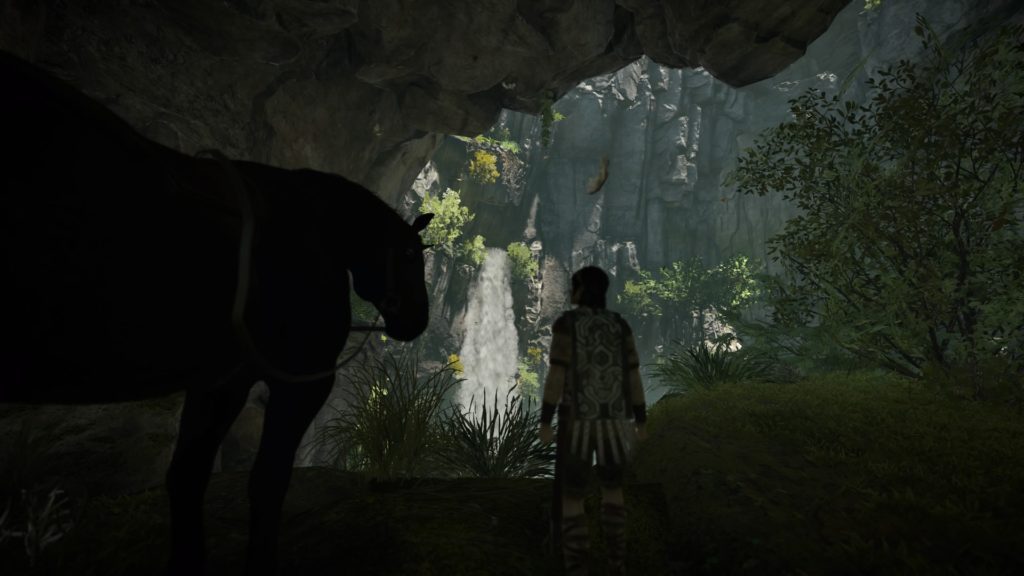
SCE Japan Studio/Team Ico’s Shadow of the Colossus still stands as one of the most incredible games ever made, and Bluepoint’s faithful remaster of course deserves special mention for not only providing a gorgeous definitive version of the game to its long-time fans, but for serving to invite a new generation to participate in this unmissable experience. One of the most impressive features of the game was how it was able to tell such a delicate and emotional story with such little dialogue. Instead the narrative was artfully tied to the gameplay itself: the essence of the story expressed inherently through the long and perilous journey the player, as Wander, embarks on to restore Mono to life.
Your only companion on this epic voyage was Agro, your trusty steed. Just a horse she was not, she was also your friend and protector. Where Yorda’s bond with Ico was defined by his desire to help and keep her safe, Agro was only there to help and protect the player. This cultivated a different kind of bond, one the player could easily end up taking for granted. That is until your faithful steed sacrifices herself to ensure you get the chance to finish your journey. The fact that the event was so unexpected only intensified the emotional impact. And yes, as I watched Agro plummet to the waters of the ravine below, a few man-tears were shed. But then we had to dry our eyes, repress our sorrow and press on to face that final Colossus. And our determination was rewarded when Agro limped on screen during the credits. Oh the relief!!!
#10. Fable II – Man’s best friend

Lionhead Studio’s first Fable was arguably one of the most over-hyped games of all time. Game director and master-of-overstatement Peter Molyneux made every promise short of declaring playing it would cure cancer. With Fable II, however, the marketing approach was noticeably more modest – which is ironic considering how brilliant the game turned out to be. One notable difference from its predecessor was the addition of a canine traveling companion. The fact that your dog was not only cute but actually useful – both during combat and free-roam – ensured a bond of companionship was inevitable. And, in keeping with the weird theme this article has suddenly developed, your loyal animal comrade eventually proved its loyalty in that most devastating of ways: by jumping in front of a bullet. And as with Colossus, this twist was made all the more devastating by just how shocking it was.
Fable has always been a mature game, sure, but even with all the dismemberment and dangerously-tempting evil deeds, Albion’s Disney-like wonder and lovable childish humour always seemed to keep the game light and mirthful. Mirth was decidedly absent from the ending, however, with you not only having to watch your puppy friend die but also make the decision of whether to revive him, at the cost of ‘countless innocent lives’. And to those who snubbed both options in favour of a fat sack of gold: shame on you heartless chicken-chasers!
#9. Uncharted 4: A Thief’s End – That damn epilogue
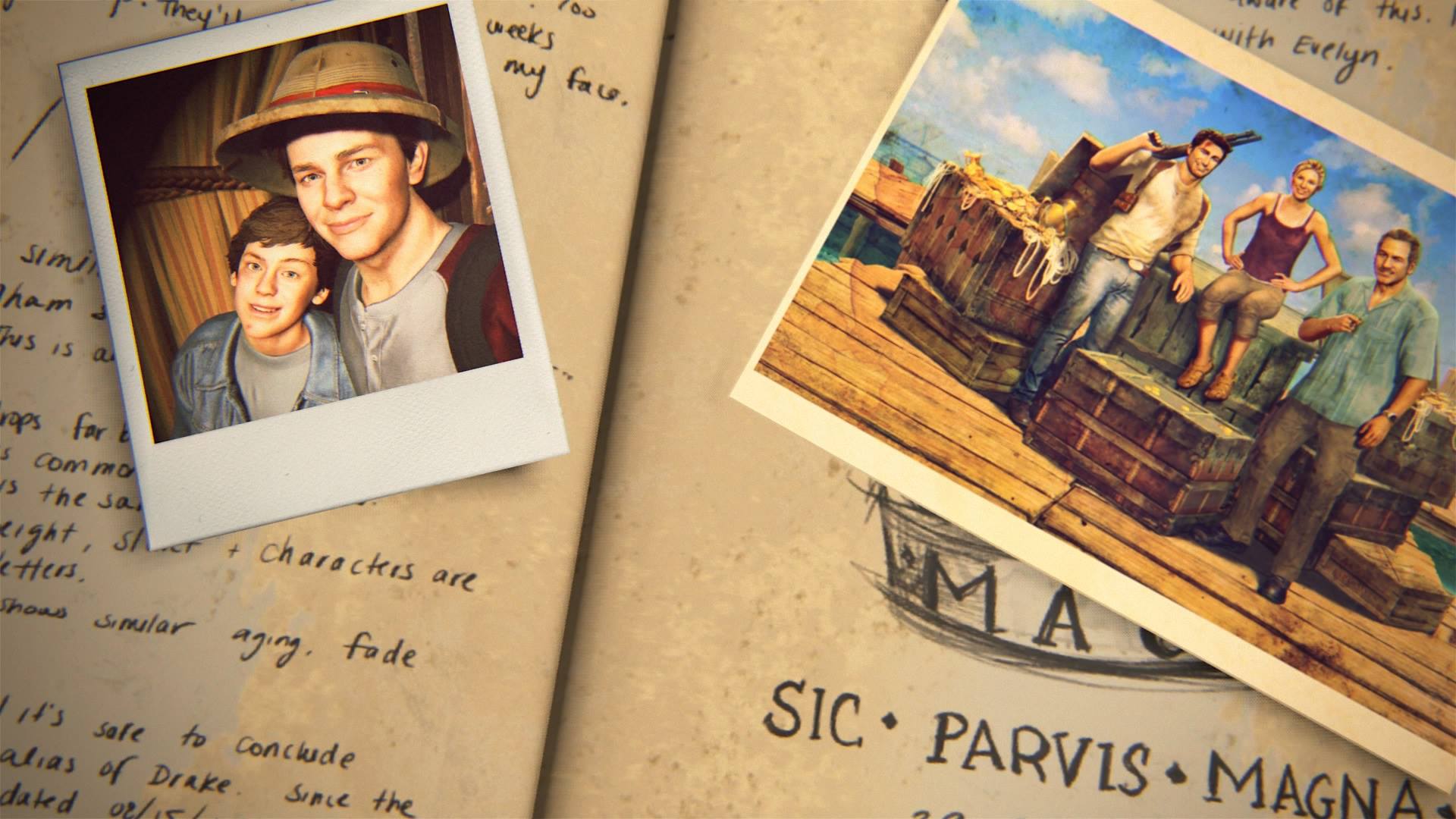
Uncharted‘s stories have always been relentlessly exciting and each one has no doubt sported some very emotional moments. That being said, none of these moments served to be, at least for me, quite ‘tear-worthy’. Uncharted 4 followed pretty much the same pattern…until that damn epilogue. It’s all over: Sam’s safe, Rafe’s dead, Nate and Elena are all smooches again, Sully’s…well, still Sully. So why exactly are we here playing Crash Bandicoot? Because Naughty Dog weren’t done yet. They had wrapped up Uncharted 4‘s story, sure, but they still needed to wrap up the franchise: to provide that perfect ending to Nate’s story. And while all previous Uncharted endings were about looking forward, Uncharted 4‘s was about looking back.
As Cassie, we go about exploring before the family boat trip and eventually stumble upon the keys to Dad’s secret cabinet. What do we find inside? The coin we picked up in a German U-boat, Francis Drake’s decoder, some resin from Shamballha and various other souvenirs from our previous adventures. As Nate and Elena walk in, catching Cassie snooping, they decide its time to tell their daughter the full story. And as Nate begins his tale about finding an empty coffin off the coast of Panama, the trio leave without us while we are granted one last look at the photo of three of our favourite ever characters: smiling, standing over a bunch of ‘Spanish-looking treasure’. It was time to say goodbye. Is it just me or do goodbyes suck?
#8. Kingdom Hearts – The importance of friendship
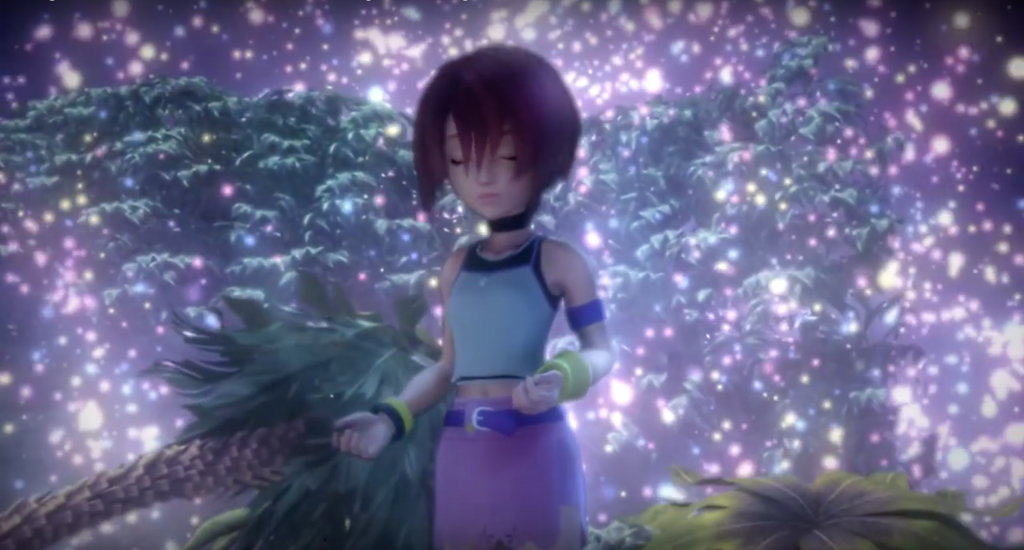
‘Disney and Square Enix’. This most unlikely of partnerships began, believe it or not, in an elevator with a chance encounter between a Square producer and a Disney executive. Now, almost 20 years later, Kingdom Hearts exists as on of the industry’s most recognised and most beloved franchises. The first Kingdom Hearts was an absolute joy to play: originality and nostalgia effortlessly rolled into one glorious whole. Allowing players to meet and fight alongside their favourite, accurately-voiced Disney characters was always going to be a winning concept. But the fact that the most ‘heart’-felt (sorry) moments exclusively featured the series’ original characters proves just how much care (see, I didn’t say ‘heart’….dammit) went into the creation of the story.
Don’t get me wrong, Kingdom Hearts‘ story, on the surface, is utter nonsense: a confusing, convoluted mess of ‘light and darkness’ concepts that rival even the most complex JRPG narratives. But underneath it you’ll find a myriad cast of empirically lovable characters whose true narratives revolve around a concept anyone with some semblance of a childhood can relate to: friendship.
The ending to the first Kingdom Hearts proved a deeply affecting one for me personally. A slowed-down version of Utada Hikaru’s Simple and Clean playing as gorgeous cinematic visuals depicted the restoration of Destiny Islands. Then the fade-out of Kairi crying over that chalk drawing in the cave as the credits proceeded to remind us of all the wonderful characters we’d met on our adventures. Granted I was practically on the verge of tears already, as the the final level’s seemingly endless cavalcade of boss fights meant that by that point I existed only as an emotionally defeated bundle of limbs sprawled out on the floor. I suppose the closing cutscene just gave that last, crucial nudge.
#7. The Last of Us – Joel’s first taste of the apocalypse

Naughty Dog are hailed as one of the great video-game storytellers for good reason. If you think about it, however, those stories are usually quite straightforward and simplistic in a way. What sets Naughty Dog apart then? Simple: a mastery of the art of characterisation. What makes their stories so transcendently engrossing is the fact that we care so much about what happens to the characters they design and give voice to (using some of the best voice-acting talent around). And there is no better example that showcases the skill this developer possesses at forging player-character relationships than in The Last of Us‘ prologue, where they took full advantage of their talent and delivered one of gaming’s most emotional moments.
All it took was one 2 minute opening cutscene to make me care about Joel and Sarah. Seeing they live alone, learning Sarah stayed up just to give her father his birthday present when he got home, a little joke about ‘hardcore drugs’ and boom that was it. Little did I know a mere 15 minutes later I’d be sat weeping as Joel cradles Sarah’s lifeless little body, pleading for her not to go. Naughty Dog, I love you and all, but **** you. Now excuse me while I go play The Last of Us again.
#6. Bioshock Infinite – Elizabeth’s fingertip
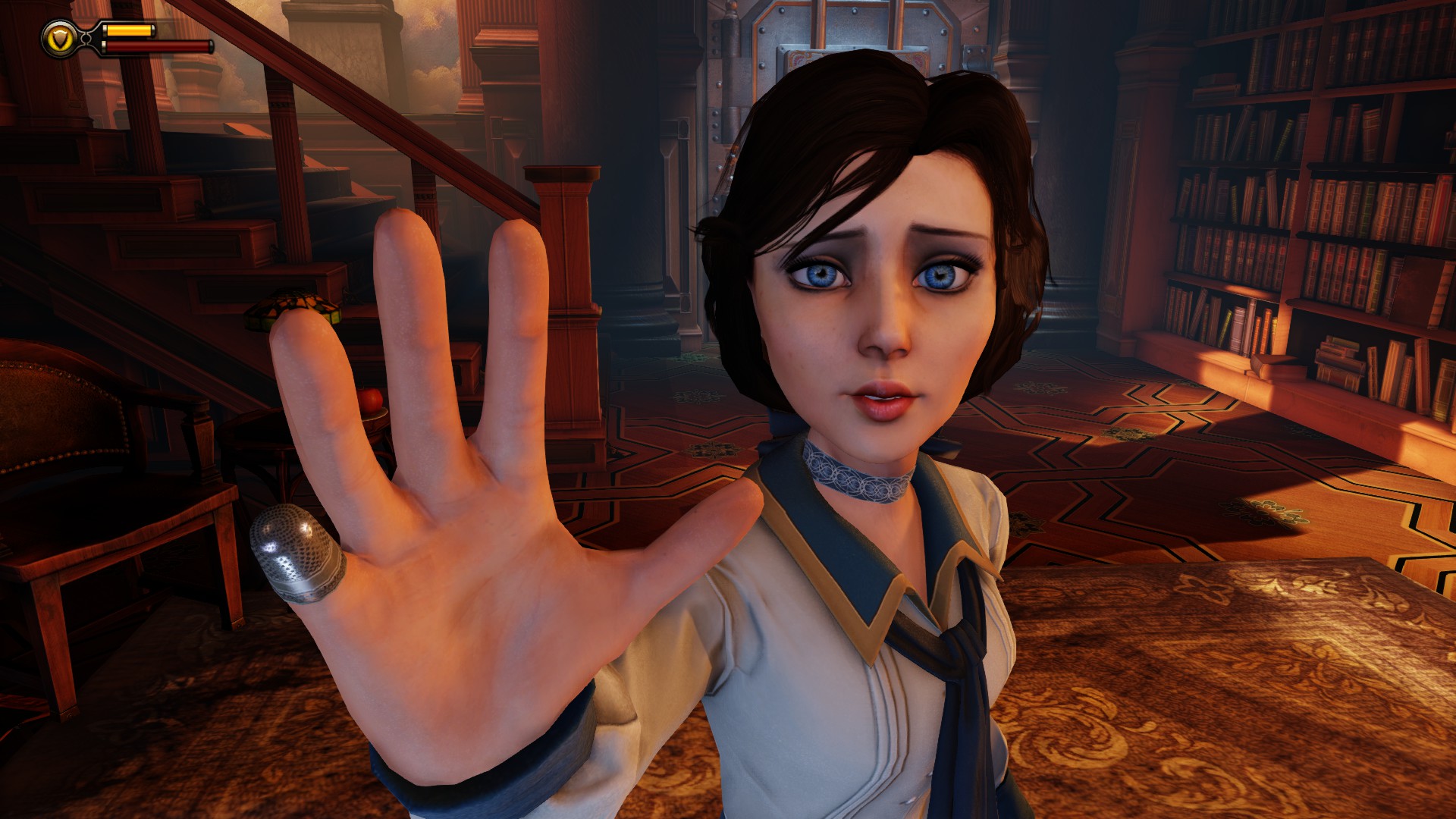
Irrational Games’ Bioshock Infinite told a very complex and sophisticated story (to say the least) and its closing chapter served up of one of the best, albeit most disorienting, endings in gaming history. Anyone able to follow that epilogue of infinite lighthouses on their first playthrough deserves a medal (seriously, we’ll make you one). But as the player traveled from lighthouse to lighthouse, each door leading to a scene from Booker’s life before he came to Columbia (and after? and before again? and…you know what brain, just no), one door eventually led to arguably the franchise’s most poignant moment.
Booker sees Comstock about to take his daughter through a rift and, having changed his mind about the value he placed on his child’s life, rushes over to stop him. Unable to wrestle Anna from Comstock’s grip, Booker and the player are forced to watch in slow-motion as Anna, confused and scared, reaches out one last time for her daddy. As the portal closes completely it leaves one thing behind: the tip of the baby’s tiny outstretched finger. Not only was the scene itself deeply touching (couldn’t resist), it was also the point at which the player realises Elizabeth is in fact Booker’s daughter.
Whether we at that point fully comprehended just how in the Bucking Bronco this twist was possible didn’t matter; the emotional impact was certainly hard-hitting. Like a Skyhook to the face hard-hitting.
#5. Red Dead Redemption – The last remnant of the Old West

Rockstar never fails to tell a great story, but Red Dead Redemption unquestionably stands as their crowning achievement. This was largely a result of the dedicated (even by Rockstar standards) focus placed on character development. GTA protagonists, as interesting and entertaining as they may be, primarily serve as the conduits through which the player perceives and experiences the perils and preposterous nature of American society. Their individual narratives are certainly fun and intriguing, but the games’ satirical sandbox settings are generally where the true essence of the story lie. Red Dead, on the other hand, is a game about one thing: John Marston.
The open western setting is just as expansive and engaging as any GTA city, but serves primarily as the peripheral backdrop to Marston’s own adventure: his supposed ‘redemption’. Wanting nothing more than to leave his outlaw past behind, Martson is instead manipulated by the government into confronting it in the most poetically brutal fashion: by hunting down his former brothers-in-arms. Only then, they tell him, will the sins of his past be truly forgiven.
Sadly, while John Marston no doubt achieves his redemption, it is the way in which he does so that serves to be the most emotionally resonant moment in the story. As desperately as he wanted to be a part of his family’s new life, Marston knew it was never meant to be as, in his own words: “People don’t forget. Nothing gets forgiven.” And so Marston redeemed himself in the only way he ever truly could: by facing the consequences of his past head on, sacrificing himself so that his family might live the life of peace and innocence they deserve. And so passed one of the last remnants of the Old West, and a true gaming legend…
#4. The Walking Dead: The Game – Poor little sweetpea
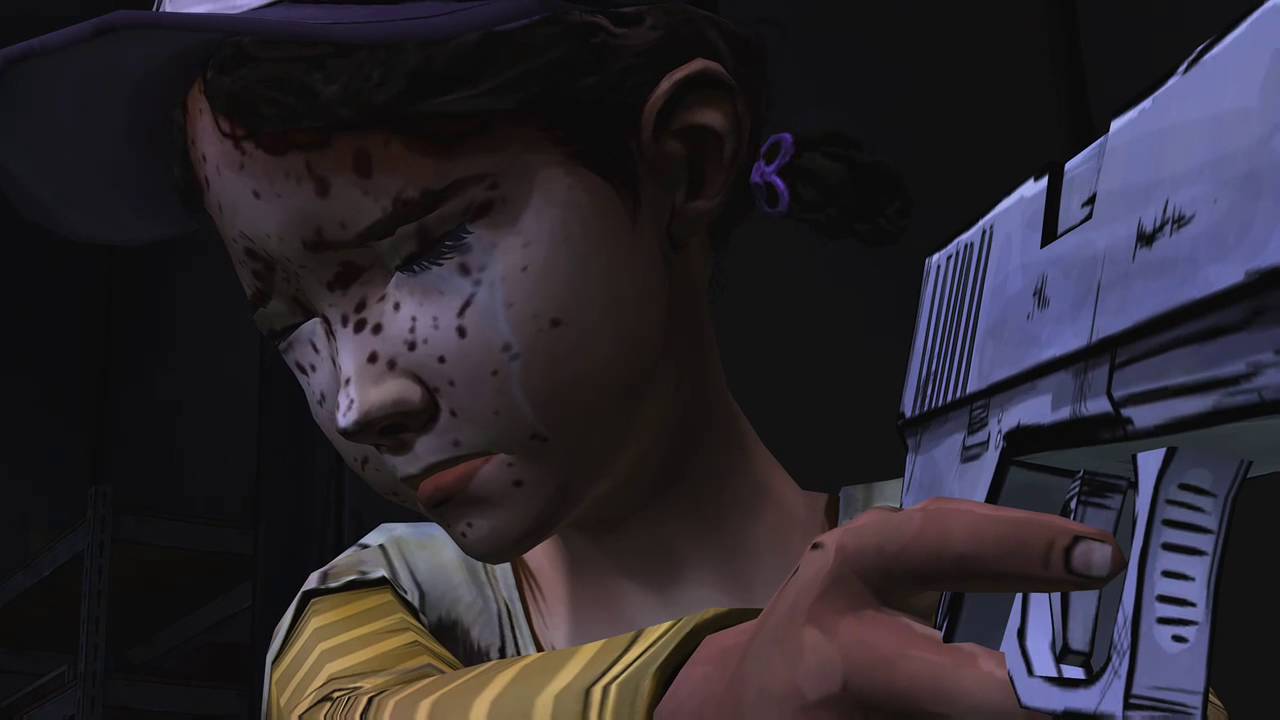
Telltale had been making episodic games long before Clementine and Lee formed their unlikely duo. Before The Walking Dead there was Sam and Max, Wallace and Gromit, Tales of Monkey Island and Back to the Future (there was also Jurassic Park but I’m choosing to ignore that one for the sake of the article…and for the sake of the developer’s reputation). These games represent a different time for Telltale: narrative was important no doubt but stood more as the sidekick to tricky puzzles and good humour. With The Walking Dead, however, this dynamic was flipped on its groaning, brain-eating head.
There were many emotional moments in this game but none more so than at the end of the final episode. Whether the choice of leaving Lee to turn or making sure he never did was a hard one or not, the emotion surrounding it was almost unbearable. Having helped Clementine through everything, watched her grow brave and strong, seen her stand her ground through all the horrible things she’s had to endure; you were forced to accept that your part was now done. It was time for little sweet pea to go it alone. Even though Season 2 put you in the company of some great characters, both old and new, the hole Lee left in Clem’s soul was always so strongly felt by both her and the player. Nobody could and ever would replace Lee.
#3. Final Fantasy VII – The cycle of nature

Final Fantasy VII first deserves special commendation for being the oldest game on this list. The affective power video-game narratives can exert over players feels to many a somewhat recent phenomenon, but the emotional weight game-stories potentially carry can be observed as far back as 1997. The Final Fantasy franchise had already proven it could tell very unique and emotive stories, but with the series’ seventh iteration Square Enix broke new ground. The predominant reason for this was the decision to abandon the tried-and-tested 2D graphical format; electing instead to construct complex 3D environments and fully animated polygonal character-models. The idea of attaching oneself to a bunch of characters that look like clumsy cardboard-cutouts may seem amusingly strange nowadays, but back then the ability to see characters move and express themselves ‘realistically’ (notice the quote marks) was a big deal.
This notion of ‘expression’ is an important one as, like so many games on this list, Final Fantasy VII is an inherently character-driven story. And the annoying thing about character-driven stories is that when those characters die, as they so often do, it hits us a little bit harder. Or in the case of Aerith, a lot harder.
“What about us…what are WE supposed to do? What about my pain?” The scene with Cloud holding Aerith in his arms, screaming these words at Sephiroth, still stands among gaming’s most upsetting – and most shocking. Aerith’s character had already been developed so richly, especially in terms of her tender bond with our stoic, solitary protagonist, that if someone told me she was going to be killed off before I even loaded up the second disc I would have laughed them off.
It wasn’t until Cloud laid Aerith in the waters of the Forgotten Capital that I realised it was actually real, and all I could think was “How could you, Square?!…” Well, that and “Darn, I guess I shouldn’t have used all those stat-boosters on her…” Talk about ‘untimely demise’.
#2. Mass Effect 3 – An epic trilogy concluded

Ok so this is probably going to be one of the more controversial items on this list but since Bioware’s Mass Effect trilogy remains one of the most immersive and personally gratifying narrative experiences I have ever found in a video-game (or indeed anywhere else) I couldn’t bring myself to place it any lower. Now let me just say that the first time I finished ME3, I had the exact same reaction that most gamers seemed to – which can be elegantly summarised as: “Wait…are you f****** kidding me?!!” I certainly ‘teared-up’ the first time I played it but I couldn’t tell if those tears were created from the part of me that was sad or the part that wanted to punch a hole in my wall.
Elements of the ending certainly impressed me; such as how the origin and purpose of the Reapers somehow made an interesting sort of sense and how the final choice posed an actual moral/philosophical dilemma as opposed to the binary ‘good vs evil’ dynamic many games tend to opt for. The problem was I had around 178 questions and didn’t feel any of them were being answered. ‘What even is the Catalyst and who created it?’ ‘If synthesis is an option, why hasn’t it been done already?’ ‘How is everyone going to get back to their home-worlds if the relays are destroyed?’ And most importantly: ‘What the hell happened to Garrus?!‘ Where before we were used to the games showing us our decisions came back to us in some form, the abrupt and ambiguous nature of the trilogy’s ending left us practically in-the-dark regarding the consequences of arguably our most important decision.
Consequently Bioware ended up being essentially cyber-bullied into releasing an ‘Extended Cut’ of the endings as a free download. And, without us condoning certain gamers’ somewhat questionable interpretation of ‘friendly fan-feedback’, the added scenes did in fact make a big difference upon that second play-through. Explanations were furthered, a romance was concluded, companions were given more screen-time (there you are, Garrus!) and the relays were instead only partly destroyed. They may have overdone it a bit with the rather condescending narrated image-montage but I shamelessly admit that final scene depicting the surviving Normandy crew adding Shepard’s name to the memorial wall broke me completely. Without feelings of anger and confusion to distract me, realising my epic journey as Shepard was now actually over was infinitely harder to accept the second time round.
#1. Life is Strange – The true meaning of ‘immersion’

Right, so firstly let me just say that if you haven’t played Life is Strange yet, then I’m pretty sure there’s something you need to be doing right now. Second, while the previous entries on this list haven’t exactly been awash with ‘impartiality’, I am warning you now that this one is going to be exclusively, almost belligerently, personal (I have in fact heavily plagiarised a letter I actually sent Dontnod after finishing the game). This is because Life is Strange represents the most deeply affecting, nigh-on transcendent, narrative journey I have ever ventured on.
Games such as Mass Effect, Bioshock and The Last of Us all hold very comfortable seats in my Top 10 of-all-time list quite simply because I can easily cite them as definitive examples of games that champion what I consider to be the best quality any video-game can be associated with: ‘immersion’. And prior to playing Dontnod’s remarkable title, I had a pretty solid idea of what I believed the definition of ‘immersion’ to be; what it meant and how it felt. Upon finishing that devastating final episode, however, I instantly realised I had no idea what I was talking about.
If, prior to completing this game, someone had asked me, “What do you mean by ‘immersion’, when you’re talking about games?” Well I would have probably said something along the lines of; “I suppose it’s that feeling of being truly engrossed in a narrative, of developing tangible connections with its characters, of feeling like you’re not just a spectator to the story but an active and meaningful participant.” If someone asked me that question now, however, I wouldn’t really know what to say exactly. While my previous answer remains valid and altogether true, it nevertheless now stands as a criminal oversimplification of such a concept. It would be like trying to pass off the definition of ‘euphoria’ as ‘when you feel really, really good’. Words just wouldn’t and couldn’t do it justice. You must simply experience it to truly understand.
I’ve thus now decided the absolute best way to answer the question “what does being genuinely immersed in a video game actually feel like?” is with 4 very simple, monosyllabic words: “PLAY LIFE IS STRANGE”. I have never felt so perfectly in-sync with the consciousness, desires and emotions of a protagonist. I have never felt such an intense and powerful personal connection to a character, video game or otherwise. And I have never been so deeply and lastingly affected by an ending to a story as I was, and in a sense still am, by the ending to this game. Quite simply: I have never cried like I cried for Chloe…
And so concludes our list of some of gaming’s most emotionally riveting moments. I shall not take up any more of your valuable time, after all I’m sure you’d all like to start replaying some of the brilliant titles on this list. Just make sure to have the tissues handy…





Valiant Hearts is also one of these games.
Haven’t got around to playing that one just yet, although I will make sure I do so!
But have you played Life Is Strange before the storm both of them made me cry but that ending was so emotional.
Good day! Do you use Twitter? I’d like to follow you if that would be ok.
I’m definitely enjoying your blog and look forward to new updates.
Thanks! You can follow GameRVW on Twitter here for all the latest updates: https://twitter.com/g_r_v_w
@Trent Ashamedly, no I haven’t. I loved the original game so much, that I became paranoid about how BTS would inform the original story. Particularly with Chloe: what I loved about Chloe was that she was this unpredictable, volatile and complex character, who you could never really quite ‘suss out’. There was so much complexity to her, you could never tell what she was going to do or how she might react, and I found that really fascinating. So the idea of actually playing as her, making her decisions for her, seemed weird to me. Like it would somehow taint the ‘mystical’ quality her character had developed over the course of the first game (especially with the climactic, nigh-on mythical sacrificial ending she was given in my playthrough). That being said, I really love the idea of experiencing the story of Chloe and Rachel’s friendship so I always intended to play BTS (in fact I own it) – I’ve just been endlessly putting it off!
Hi there, You have done a great job. I’ll certainly
digg it and personally suggest to my friends.
I think the admin of this site is truly working hard for his website, because here every stuff is quality
based stuff.
Hi, I check your new stuff like every week. Your writing style is witty, keep up
the good work!